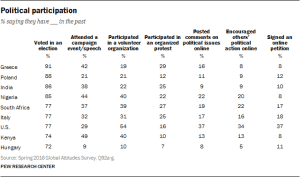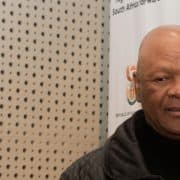|
Getting your Trinity Audio player ready...
|
A new nine-country survey by the Pew Research Center (PRC), a US non-profit organisation, has found a common perception that government is run for the benefit of the few rather than the many‚ both in emerging democracies and more mature democracies that have faced economic challenges.
The survey probes the strengths and limitations of civic engagement in government in nine countries, and was conducted among 10 828 respondents from 29 March 29 to 9 July 2016.
Four EU nations are included – two (Greece and Italy) that have struggled economically in recent years and two (Hungary and Poland) that are former communist countries and have recently experienced substantial support for nationalist political leaders. Three of sub-Saharan Africa’s most important political and economic hubs are included – South Africa, Kenya and Nigeria. The survey also includes the world’s two most populous democracies, India and the US.
Even though these nine nations are very different, says PRC, there are many common themes in their views about political participation.
Most say citizens can make a difference
In eight of the nine countries, around half or more people believe there is much they can do to influence how the country is run if they are willing to make the effort – with the exception of Hungary. In South Africa that figure is 62%, as opposed to 32% who feel there is no point. These optimistic South African respondents put the country third in this respect, after their counterparts in Kenya (69%) and Nigeria (68%).
Majorities in all three African countries surveyed believe that the government is run for the benefit of only a few groups of people. South Africans are especially likely to believe this. Those in South Africa with a secondary education or more are more likely to think government is run for the benefit of a few groups (81% vs. 63% for those with less than a secondary education), but also more likely to believe that ordinary citizens can influence the government (68% vs. 58%).
To wield that influence, individuals in these nine nations engage in a variety of political activities, although voting is the most common by a wide margin in each country. Some also say they engage in other traditional forms of participation, such as attending a campaign event or volunteering.
Furthermore, respondents in all nine nations say they could potentially be motivated to become politically engaged on a variety of issues, especially poor health care, poverty and poor quality schools. Six countries name poor health care as the main motivating factor in taking political action, such as contacting an elected official or taking part in a protest. Health care, poverty and education are the top three motivators in all nations except India and Poland.
In South Africa 47% of people say they would be very likely to take some kind of political action against corruption, followed by 44% in Kenya and 39% in Nigeria.
Youth express opinions differently
The survey finds that in terms of voting, the majority of voters are in the 50+ age group. While it can be argued that older people have experienced more elections and have had more opportunities to vote, in most of the nations, says PRC, the turnout of younger voters is not as high.
However, online engagement is more common amongst the younger age groups. In six of nine countries, 18- to 34-year-olds are significantly more likely than those 50 years and older to say they have posted their thoughts about political or social issues online. Similar trends are found for signing petitions online or encouraging others online to take action on political issues.
The survey also notes that many of the people getting involved in politics online are the same people who are politically engaged offline.
Africans favour traditional participation
 Reported political participation rates in the three African countries surveyed are highest for traditional forms of participation – voting in an election, attending a campaign event or speech and participating in a volunteer organisation.
Reported political participation rates in the three African countries surveyed are highest for traditional forms of participation – voting in an election, attending a campaign event or speech and participating in a volunteer organisation.
About three-quarters or more say they have voted in an election at some point in their lives.
The age difference between those who have and have not voted in the past is greatest – out of all countries surveyed – in Kenya and South Africa, where almost all older adults have voted in the past (95% and 94%, respectively), compared with fewer younger adults (59% and 62%, respectively). In Nigeria, 80% of younger adults report having voted, but they still trail their older counterparts by 10 percentage points.
In South Africa, where the ANC has been in power for over two decades, only 37% say they have attended a campaign event, compared to Kenya’s 49%. And in all three African countries, about 40% have participated in a political, charitable or religious-based volunteer organisation.
In addition, 27% of South African respondents say they have participated in an organised protest, 19% have commented on political issues online, 22% have encouraged others to get involved in politics online, and 17% have signed an online petition. Taking part in organised protests is also influenced by gender – in South Africa, men (33%) say they are more likely than women (22%) to have taken part in a protest.
All of this seems to indicate that, while 62% of South Africans believe they can do much to influence the government, fewer than half of those actually put their words into action.
The likelihood that people will take action over a range of issues varies by educational background. In South Africa, those with a secondary education or more are more likely than those with less to say they would take action on all but one of the issues tested – police misconduct. For example, 74% of those with a secondary education or more are likely to take action on poverty, while 62% of those with less than a secondary education are similarly inclined.
Those with more education are more likely to take political action on the issues of poor health care in all three African countries.








